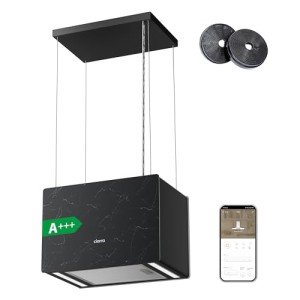Nine Things That Your Parent Teach You About Island Hob
페이지 정보

본문

The Island Vent Hood: A Comprehensive Guide to Choosing and Installing the Perfect Kitchen Feature
In modern-day kitchen design, the island vent hood has actually ended up being an essential centerpiece, flawlessly combining functionality with visual appeal. With the increase of open-concept home, where kitchen areas are integrated with dining and living areas, the importance of a well-designed ventilation system has actually ended up being critical. This article explores what an island vent hood is, the various types available, key functions to think about, installation tips, and FAQs surrounding this essential kitchen part.
What is an Island Vent Hood?
An island vent hood is a kitchen ventilation system created to be set up above an island cooker extractor hood cooktop or range. Unlike standard wall-mounted hoods, island hoods are suspended from the ceiling, island hob providing a clear view of the cooking area while effectively getting rid of smoke, steam, and smells from the kitchen. This makes island hoods an appealing option for open layouts while making sure a tidy and comfy cooking environment.
Types of Island Vent Hoods
When selecting an island vent hood, it is vital to understand the different types offered in the market. Here are the primary categories:
| Type | Description |
|---|---|
| Ducted | Ventilation is directed outside, supplying the best air quality by expelling air and smells. |
| Ductless | Uses filters to clean up the air and recirculate it back into the kitchen; much easier to install. |
| Convertible | Can operate in both ducted and ductless modes, offering flexibility in installation. |
| Under-Cabinet | Installed under kitchen cabinetry; normally lower output, appropriate for smaller kitchen island hoods designs. |
Secret Features to Consider
Choosing the best island vent hood involves numerous important factors. Here are the essential functions to consider:
- Size: The hood needs to be at least as large as the cooktop. Ideally, it should extend 6 inches on either side for optimum efficiency.
- CFM Rating: The Cubic Feet per Minute (CFM) score shows the hood's ventilation power. Greater CFM is required for heavy cooking, while lower CFM may suffice for lighter usage.
- Noise Level: Measured in sones, a lower sone ranking indicates a quieter operation. A quiet fan is especially crucial in open-concept spaces.
- Lighting: Many island hoods come geared up with integrated lighting. LED lights are popular for their energy performance and longevity.
- Design: Island vent hoods come in numerous styles, consisting of modern-day, traditional, and commercial. Pick a hood that matches the total kitchen visual.
Installation Tips
Installing an island chimney hood vent hood can be an intricate procedure. Here are some necessary pointers to help with the setup:
- Check regional codes and policies to guarantee compliance with installation height and electrical requirements.
- Figure out the hood's height: The top of the hood ought to be 30 to 36 inches above the cooking surface area, depending on the maker's recommendations.
- Protect the installing bracket: Ensure that the mounting bracket is appropriately anchored to the ceiling to support the weight of the hood and motors.
- Ductwork factors to consider: If using a ducted system, guarantee appropriate duct size and design for optimal air flow. Prevent sharp bends in ducting, which can hinder air motion.
- Electrical setup: Ensure that the electrical connections fulfill your hood's power requirements, and think about hiring a licensed electrical contractor for complex setups.
Cost Considerations
The expense of an island vent hood can range significantly depending upon functions, products, and brand name. Below is a breakdown of prospective expenses connected with buying and installing these hoods:
| Cost Element | Approximated Range |
|---|---|
| Fundamental Models | ₤ 300 - ₤ 600 |
| Mid-range Models | ₤ 600 - ₤ 1,200 |
| High-End Models | ₤ 1,200 - ₤ 3,000+ |
| Installation Costs | ₤ 200 - ₤ 500 |
Often Asked Questions
1. How typically should I clean my island vent hood?Regular cleaning is encouraged, with deep cleansing a minimum of once a month, particularly if you prepare often. 2. Can I set up an island vent
hood myself?While it is possible, professional
setup is suggested for safety and optimal efficiency, particularly with ductwork and electrical connections. 3. Are ductless island hoods effective?Ductless hoods can efficiently filter
smoke and smells, but they might not be as effective as ducted models. They need routine filter replacements and maintenance. 4. What kind of upkeep does an island vent hood require?Regular cleaning of filters, lights, and hoods, in addition to looking for Island hob any wear and tear on motors or ductwork is crucial for preserving efficiency
. 5. What type of filters must I use?Most island vent hoods utilize aluminum or charcoal filters. Aluminum filters are multiple-use, while charcoal filters need to be changed
regularly. The Island hob vent hood is an essential part of a contemporary kitchen, providing fatigue of unwanted odors and making a striking style declaration. Choosing the best type, comprehending necessary
functions, and sticking to proper setup strategies will ensure optimal efficiency and longevity of this kitchen home appliance. Whether you are a seasoned chef or an occasional home cook, the ideal island vent hood can significantly boost your cooking experience. By following the guidelines and considerations outlined in this short article, house owners can make informed decisions and delight in a cleaner and more satisfying cooking environment.
- 이전글8 Tips For Boosting Your Double Glazed Window Repair Game 25.05.11
- 다음글You'll Never Guess This Best Island Cooker Hood's Tricks 25.05.11
댓글목록
등록된 댓글이 없습니다.



